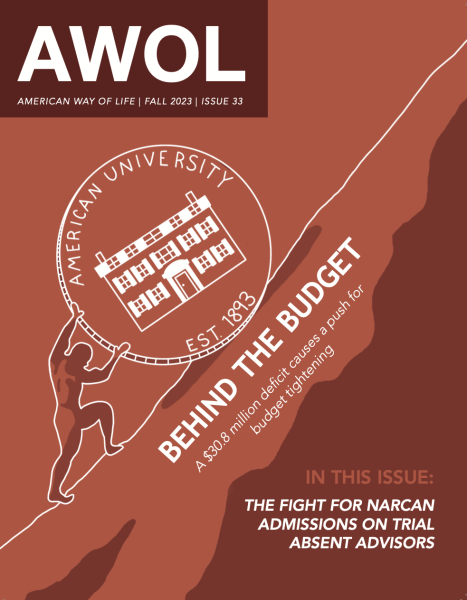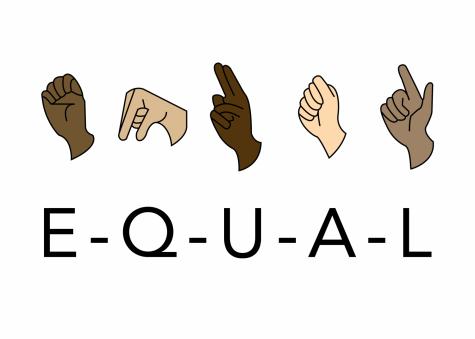“Here In My Garage…”: False promises from “web influencers”
In 2017, digital advertising revenue surpassed television, broadcast, and cable advertising combined. With the increased potential to earn money online, digital advertising has produced a lot of hype, therefore intensifying the interest of others to get involved.
Digital marketing advertisers, or ‘Wealth influencers’, use a bevy of unethical marketing practices, including bogus ads, fake followers, and fraud, to seek out dupable web browsers and brands also attempting to grab a piece of this digital marketing pie.
“They’re basically selling people the idea of being successful, but the only reason that these people are successful is because there’s a lot of people who will come together and try to understand this,” Dr. Ben Wright, a professor in the Marketing Department at American University’s Kogod School of Business, said.
In 2015, an Australian construction worker named Tim McKinlay left his job to enter the space of making money online himself.
“I grew to really dislike the daily grind, so I decided that I was going to find a way to earn money online somehow,” McKinlay said.
It was this motivation for a career change that led an inexperienced McKinlay into the waiting arms of digital marketing influencers.
“I think it’s kind of exploiting a specific segment of the market of individuals who maybe aren’t happy with their job, or maybe want to reach that level of fame,” Wright said.
People who are unhappy with their job can become an easy target for online wealth influencers offering them a pitch that is too good to be true. They claim to have all the answers needed to make money online, or some secret formula to get you there. However, it only takes a quick YouTube search of “Make Enough Money Online to Quit Your Job” for anyone to find an endless list of online marketers all claiming the same thing.
McKinlay spent years buying into various influencer programs with extremely unsatisfactory results. He said that influencers themselves know that their offers, be it a course or a tool of some sort, are not as good as they are trying to lead hopeful candidates to believe.
What influencers’ pitch may have worked for them to create success, but it doesn’t necessarily mean it will also help someone else achieve the same.
“I don’t think there’s any research that shows that [influencers] are actually successful in doing that,” Wright said. “It doesn’t lead to more successful entrepreneurs I don’t think. I mean, I don’t know how they would measure that.”
These influencers have created complex ‘funnels’ that are a series of steps meant to compel an initial action. Funnels create awareness and interest around a brand that builds an audience for them to sell their products to. Commonly, something free is offered to coax Internet users into their community – something known as the foot-in-the-door technique. This is where their sales originate from. It becomes a numbers game to obtain the most followers in order to entice high-paying advertisers wishing to get in front of wide, and sometimes targeted, audiences.
In the business of digital marketing web traffic is money that influencers can coax paying brands with. This can result in deceptive practices meant to leverage influence into revenue. The few influencers who actually are popular stay relevant and profitable by continually producing content that keeps them that way.
“These people get a following and they just grow it because they kind of exploit all these different platforms, like podcasts, like YouTube, like webinars, like live events, that’s where they make their money,” Wright said. “They end up charging people, or there’s paywalls involved, or they get advertisers to come in.”
Simple pageviews can translate into advertising revenue for a publisher, or at least compound their followership and prove to brands they own the influence they claim. This has lead to a clickbait culture, especially among digital marketing influencers using their ostensible images of success.
“They all seemed to be the same,” McKinlay said. “They tell you what you want to hear, so you buy hoping this is the one. This space is just so full of scams it is hard to believe.”
“I think that the barriers [of] entry are lower today for someone to develop this kind of skill-set and develop this personality and popularity,” Wright said. “I haven’t seen anything that shows there’s a certain blueprint to lead to it. Think about viral marketing in general with digital marketing, it’s a lot of dumb luck, there’s not really a blueprint to get a video to go viral.”
In any case, added McKinlay, regardless of the sales strategy it’s a matter of whether the person pitching is transparent about their service, and whether they provide their audience with value.
McKinlay now owns affiliateunguru.com and several other niche sites devoted to making money online.

“It took me just under two years of working my butt off to reach a full-time income,” McKinlay said. “It was really a case of finding something that actually worked and that I could build a business with.”
Indeed, there are some services or products offered by these influencers that can be helpful to an eager, tech savvy twenty-something looking to make a little extra money.
“On one hand, there is nothing wrong with pitching a good product that the person will find valuable,” McKinlay said “Assuming that the ‘free stuff’ is of a high value, the offer is legitimate and full of value, and the marketing itself is ethical.”
“On the other hand, when that ‘free offer’ contains little or no value, and the products that are pitched contain little to no value, and the marketing itself is unethical, then it is a problem,” McKinlay said. “And unfortunately, this is a lot more common within the ‘make money online’ world.”
“Anybody can try and get a following going,” Wright said. “I don’t really know that their skill is linked to much other than crowdsourcing and getting people interested in what they’re talking about. I think that, maybe, is what they’re selling.”
Tai Lopez is one of the original and most infamous influence marketers to have hit the scene. Opinions about him vary widely depending upon who you believe but he has made a lot of noise in the digital advertising space.
Lopez was a college dropout, but he has been in the wealth management business since the early 2000s, according to his LinkedIn profile. In 2008, he became the owner of one of the world’s largest online dating companies, Elite Global Dating LLC. This is where stuff starts to get a little funky. Tai’s company gained a horrible reputation for using misleading tactics for nefarious reasons and also received complaints about his company through the Better Business Bureau.
Enter the “Nobody to Somebody Theorem” an idea about how random people, like Lopez, gain their fame and following. A product of internet bloggers, this theory says that a “nobody” creates compelling content, such as a tour through a mansion, to portray themselves as a “somebody,” to eventually earn the façade that they are indeed important and deserve your attention.
Lopez, for example, features fancy sports cars, enormous mansions, and other extravagant items to give the impression that he is indeed “living the good life” as he calls it. In addition to his lavish lifestyle he also boasts about various levels of life and business experience, which according to his record, may raise some eyebrows.
A video set inside “his” garage, featuring a Lamborghini and an entire wall of books that Lopez claims to have read, was one of his original and most popular advertisements.
“Here in my garage – just bought this new Lamborghini,” Lopez said in the opening of his video. “It’s fun to drive up here in the Hollywood Hills. But you know what I like a lot more than materialistic things? Knowledge. In fact, I’m a lot more proud of these seven new bookshelves I had to get installed to hold 2,000 new books that I bought.”
However, marketing expert Neil Patel said during an episode of his Marketing School podcast “I’ve been to his home, I’ve seen a lot of the stuff, you know he’ll talk about cars, he’ll tell you he leases them.” He was also quoted having said during the same episode “I was at his house and we were shooting a video and there was all this cash on a table and it was fake cash, and [Tai] even tells people, ‘Yeah, its fake cash. I don’t want real cash because then someone is going to rob me’.”
Often influence marketers flaunt their phony success stories as a means of ‘proof’ that what they are selling you is the answer you’ve been searching for. However, their solution may not even be the method for their own success, said McKinlay, and in fact the truth of how they got there is often an entirely different story.
Influencers function to grab the attention of Internet users with promises of success, but the key, said McKinlay, is to look past this superficial image and ask yourself if it seems too good to be true. McKinlay knows personally that in the world of online money there is no such thing as quick and easy success, and anyone who pitches that is a sham.
While Lopez does not appear to be a scammer his noticeably false claims are hard to ignore. With a quick google search it’s easy to find a long list of people alleging inappropriate business practices on Lopez’s dating sites. Ultimately, this may or may not be true, but for someone pitching their success as a brand, these complaints fly in the face of their main selling point.
“Most of the articles I’ve seen more recently are taking down the credibility of these people,” said Wright.
There are also influencers with more obviously deceptive reputations than Tai Lopez. Elijah Oyefeso, a young 20-year-old Nigerian-born UK trader and self-proclaimed millionaire, enjoyed flaunting his luxury automobiles on social media much like Lopez until he got arrested in 2017.
Oyefeso gained a huge social media fan base in the UK parading his ostensible wealth and knowledge of trading in the stock market. His scheme is much the same as the rest, earning commission from the thousands of followers who became drawn in by his image of success and happiness.
Oyefeso was sentenced to two and a half years in prison for driving over a creditor who had loaned him money to purchase a Land Rover.
“He makes a number of claims about his wealth, but I have seen no evidence of this,” said Oyefeso’s defense counsel in court, according to dailymail.uk.
Elijah was hardly the motivated young man he portrayed himself to be. In fact, Oyefeso’s business model, or message, was practically nonexistent, according to several bloggers from a forum at BinaryOptions.net.
Innovation is the introduction of something new. Nothing “wealth influencers” are peddling online is innovative; everyone is just teaching a different way to tie a shoe. If gaining popularity and earning viewership was as simple as they portrayed it to be, then the advertising market that makes all of these shenanigans even worth it wouldn’t exist in the first place.
“From my perspective as an investor, if I had a nickel for everybody in my office who said ‘I have a great idea, give me money’ I’d be rich because the answer is an idea means nothing. Creativity is great, but that’s not an innovation,” Jonathan Aberman said during a social media event in Fairfax, VA. Aberman is the founder of an innovation consulting and venture capitalist business, Amplifier Ventures, and hosts an entrepreneurial podcast “What’s Working in Washington”.
Nonetheless, over time Tai Lopez has been able to leverage his “somebody” status into success selling his program, “The 67 Steps,” and continuing the growth of his brand. People who have had a negative experience with something usually have more incentive to speak up about it, and there could be some insightful parts of Lopez’s program. However, the experience of these “influencers” is not in business, or in happiness — it’s in generating a buzz and earning clicks.
“[They’re] making money by selling out venues at universities, cities, and convention centers by trying to use this entrepreneurial mindset,” Wright said. “My guess would be that’s where they make a lot of their money.”
According to Wright, there’s a difference between being a brand ambassador, someone not working for a company but basically showing off the functionality or usefulness of some product, versus someone who’s just trying to grow a following. In the end, they are basically just disseminating information for the sake of disseminating it, he says.
“I think a lot of it’s linked to they think it’s almost a fast track to celebrity and fame,” said Wright.

I'm a junior studying Journalism, interested in culture, politics, mental health and liberty.
A desire for truth amongst an abundance of misinformation...












